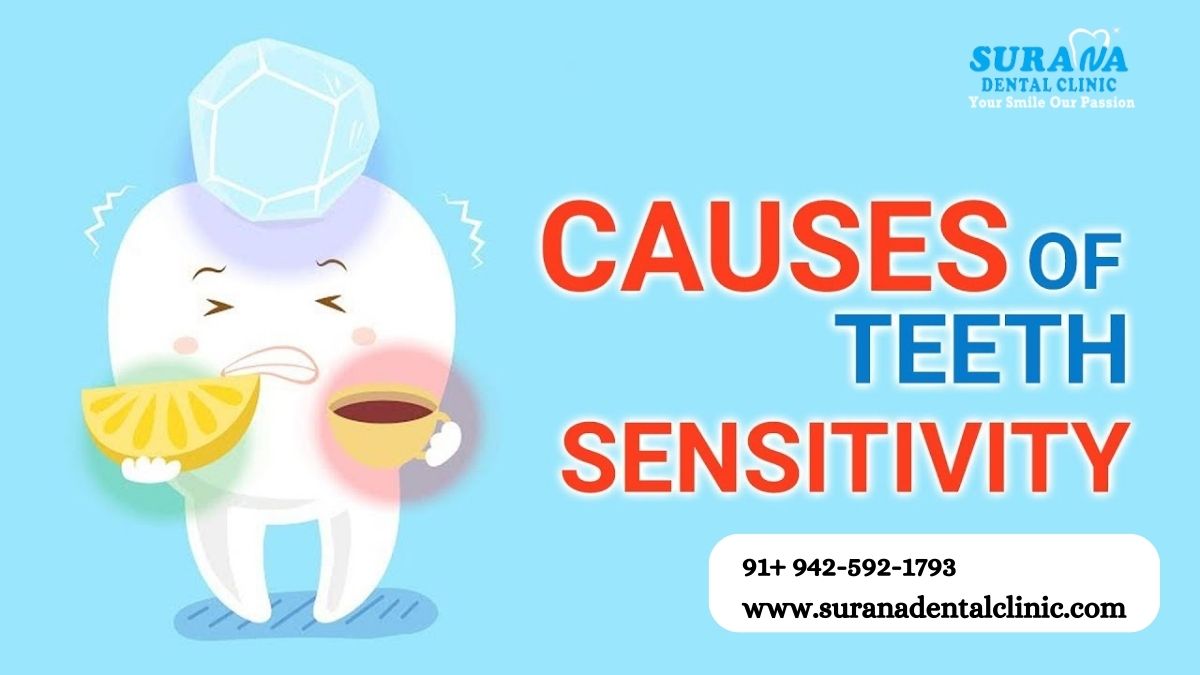Introduction – Dentist In Indore
Experiencing sensations of heat or cold in your teeth can be unpleasant and sometimes even painful. This common dental problem, known as tooth sensitivity, can indicate underlying issues. It’s crucial to consult with a Dentist In Indore to identify the causes and receive effective treatment. Here are some common reasons for Tooth Sensitivity and how a dentist can assist:
Exposed Tooth Roots: When the protective enamel on your teeth wears away, it exposes the sensitive underlying layer known as dentin. Dentin contains small tubules that connect to the nerves of your teeth, causing sensitivity to hot and cold sensations. A Dentist in Indore may recommend treatments like desensitizing toothpaste or fluoride applications to alleviate this discomfort.
Tooth Decay or Cavities: Cavities or tooth decay can result in sensitivity, particularly if they reach the inner pulp of the tooth where the nerves reside. A dentist can address cavities through treatments such as dental fillings or root canal therapy, eliminating the source of sensitivity and preserving the tooth’s health.
Gum Recession: Receding gums expose the tooth roots and make them vulnerable to temperature changes. A Dentist In Indore may suggest techniques to manage gum recession, and in severe cases, surgical interventions may be necessary to restore gum tissue and protect the tooth roots.
Cracked or Fractured Teeth: Cracks or fractures in teeth can allow temperature-sensitive stimuli to reach the nerves, causing discomfort. Your Dentist In Indore can evaluate the extent of the damage and recommend suitable treatments, such as dental bonding, crowns, or veneers, to repair and safeguard the affected teeth.
Bruxism (Teeth Grinding): Persistent teeth grinding can wear down the enamel, leading to sensitivity. A Dentist In Indore may suggest a custom-made nightguard to prevent further damage and reduce sensitivity caused by bruxism.


What is tooth sensitivity?
Tooth sensitivity refers to the discomfort or pain experienced when your teeth react to certain stimuli such as hot, cold, sweet, or acidic foods and beverages. It is often characterized by a sharp, sudden sensation in the teeth.
What causes tooth sensitivity?
Tooth sensitivity can be caused by various factors including:
- Tooth enamel erosion
- Gum recession
- Tooth decay or cavities
- Cracked or fractured teeth
- Bruxism (teeth grinding)
- Certain dental procedures
- Aging
Book An Appointment Today – https://goo.gl/maps/nSK8L4T8VfvGBkLm7
How can I alleviate tooth sensitivity at home?
Some home remedies to alleviate tooth sensitivity include:
- Using desensitizing toothpaste
- Avoiding acidic and sugary foods
- Using a soft-bristled toothbrush
- Applying fluoride mouthwash
- Avoiding teeth grinding (bruxism)
When should I see a dentist for tooth sensitivity?
You should see a dentist if:
- Tooth sensitivity persists despite home remedies.
- You experience severe or worsening pain.
- There are signs of infection such as swelling or pus around the tooth.
How can a dentist help with tooth sensitivity?
A dentist can:
Identify the underlying cause of sensitivity through examination and X-rays.
Recommend appropriate treatments such as fluoride applications, dental fillings, or root canal therapy.
Provide preventive measures and personalized advice to manage tooth sensitivity effectively.
Can tooth sensitivity be prevented?
While some causes of tooth sensitivity may be unavoidable, you can reduce your risk by:
- Maintaining good oral hygiene habits.
- Using fluoride toothpaste and mouthwash.
- Avoiding acidic and sugary foods.
- Using a mouthguard if you grind your teeth.
Is tooth sensitivity a sign of a serious dental problem?
In some cases, tooth sensitivity may indicate an underlying dental issue such as tooth decay or gum disease. It’s important to consult with a dentist to rule out any serious problems and receive appropriate treatment.
How long does it take to treat tooth sensitivity?
The duration of treatment depends on the underlying cause and the chosen treatment method. Some cases of tooth sensitivity may improve with simple measures like using desensitizing toothpaste, while others may require more extensive dental procedures. Your dentist can provide a timeline based on your specific situation.
Can tooth sensitivity affect my overall oral health?
Yes, untreated tooth sensitivity can lead to complications such as tooth decay, gum disease, and even tooth loss if left unaddressed. It’s important to address sensitivity promptly to maintain your oral health.
Is tooth sensitivity common?
Yes, tooth sensitivity is a common dental issue that affects millions of people worldwide. It can occur at any age and can be managed effectively with the help of a dentist.
Conclusion
Tooth Sensitivity can arise from various causes, and seeking prompt attention from a Dentist In Indore is crucial for proper diagnosis and effective treatment. With personalized dental care, you can address the underlying causes of sensitivity and enjoy a pain-free, comfortable smile.
